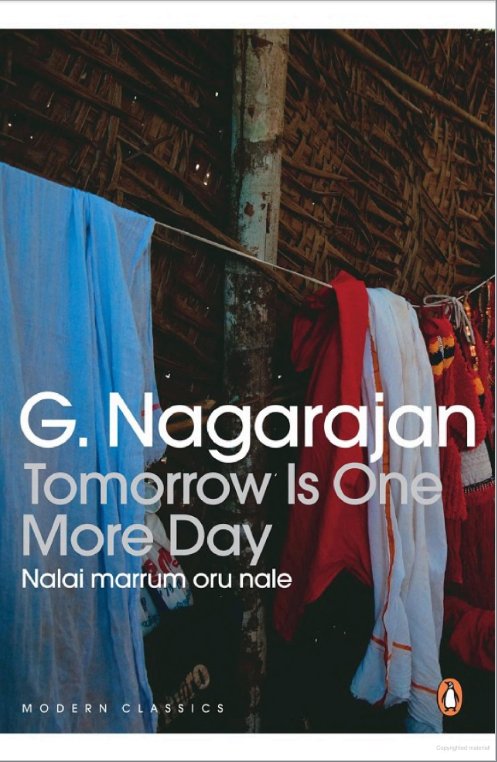
G Nagarajan's Tomorrow Is One More Day was a very quick read but one that left me wanting a LOT more. The novel was written in Tamil originally and published this novella in 1983, a few years before he passed away. I made the mistake of starting the fairly exhaustive critical review of the novella that was included in the edition of the book I bought but stopped myself midway and just decided to read the work itself. But whatever I did read appears to have coloured my understanding of the novella and I might borrow bits and pieces of it here in this review.
The novel is about a day in the life of Kandan, a middle aged pimp and fixer. He's not very educated — an 8th standard dropout — and he doesn't bother himself with most intellectual matters. While his character is something one could write about at length, what I'd like to talk about here is the way the novel is written and the way it permeates into someone from a very difference social and caste position, someone who's had interactions with people like Kandan a total number of times one could count on a left hand and still have fingers folded.
Kandan isn't a well-off person by a long way. He struggles to make a living and for his daily supply of alcohol, he goes between borrowing money from his wife to asking his neighbours to lend him a few rupees every once in a while. One thing remains constant throughout and that is how indifferent he is to this. He refuses to complain or whine about not having enough money. He finds enough money for his purposes and gets his work done.
It is, however, interesting to note that the narrator never even remotely uses romanticising this sort of life. There is also no fetishization of "simplicity" or any of the degrading things that are normally associated with accounts of not-so-well-off peoples' lives. It is refreshing in that sense and the characters just live their own lives without the reader ever having to feel the urge to normalise any of what is happening to them. And it is perhaps this facet of Nagarajan's writing that makes the novella so much more engaging to read. There is no pretence. There is no unnecessary embellishment of poverty. The story just flows, almost unbothered and even uncaring. Nagarajan's narration is also flat and devoid of judgement of any kind.
It is in a similar fashion that Kandan lives his life. Unbothered by anything but his own needs. His sense of time is quite unlike that of somebody with any modern education. He has no "goals" or "aspirations" in the way most people do as this short passage illustrates.
‘Look, tambi, I never went to any damned school. My mother always thought I’d get hit by a car or something if I went to school, so she never let me out of the house till I was ten.’
‘What’s the goal of your life, anne?’ Muttusamy asked.
‘What do you mean?’
‘What do you want to achieve in life?’
Kandan laughed. ‘What did I want to achieve when I happened to be born to Sornattammal.’ He laughed again.
He faces death of loved ones with the same unaffected nonchalance and it all makes the novel a quite remarkable read and unlike almost any other novel I've read.